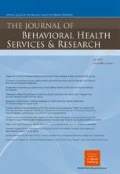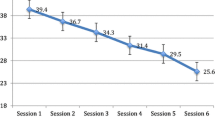Abstract
Opportunities created by the Patient Protection and Affordable Care Act along with the increased prevalence of pediatric behavioral and mental health concerns provide new challenges for pediatric health care providers. To address these matters, providers need to change the manner by which they provide health care to families. A novel approach is providing brief, rapid response, evidence-based parenting interventions within the pediatric primary care setting. Family-focused parenting programs support the American Academy of Pediatrics recommendations of improving mental health via supports in pediatric primary care to maximize the social and psychological well-being of families. A considerable body of research indicates that parenting interventions reduce the severity and frequency of disruptive behavior disorders in children and provide support to parent by bolstering parental resilience and improving overall family functioning. Providing these services within the pediatric primary care setting addresses the need for fully integrated health services that are family-centered and easily accessible.
Similar content being viewed by others
References
Karakus MC. Affordable Care Act and behavioral health services: Special Section Editor’s Note. The Journal of Behavioral Health Services & Research. 2014;41(4): 408–409.
Bittle MJ. A new vision and leadership challenge: Implementing the Affordable Care Act to improve the organization and delivery of health care services. Journal of Public Health Management and Practice. 2015;21(1): 59–61.
Leslie LK, Slaw KM, Edwards A, et al. Peering into the future: Pediatrics in a changing world. Pediatrics. 2010:peds: 2010–1890.
Starmer AJ, Duby JC, Slaw KM, et al. Pediatrics in the year 2020 and beyond: Preparing for plausible futures. Pediatrics. 2010;126(5): 971–981.
Stancin T, Perrin EC. Psychologists and pediatricians: Opportunities for collaboration in primary care. American Psychologist. 2014;69(4): 332.
Perou R, Bitsko RH, Blumberg SJ, et al. Mental health surveillance among children-United States, 2005–2011. Morbidity and Mortality Weekly Report Surveillance Summary. 2013;62(Suppl 2): 1–35.
Briggs-Gowan MJ, Owens PL, Schwab-Stone ME, et al. Persistence of psychiatric disorders in pediatric settings. Journal of the American Academy of Child & Adolescent Psychiatry. 2003;42(11): 1360–1369.
Berwick DM, Nolan TW, Whittington J. The triple aim: Care, health, and cost. Health Affairs. 2008;27(3): 759–769.
Fry-Bowers EK, Nicholas W, Halfon N. Children's health care and the patient protection and affordable care act :What's at stake? Journal of the American Medical Association Pediatrics. 2014;168(6): 505–506.
Keller D, Chamberlain LJ. Children and the Patient Protection and Affordable Care Act: Opportunities and challenges in an evolving system. Academic Pediatrics. 2014;14(3): 225–233.
Ader J, Stille CJ, Keller D, et al. The medical home and integrated behavioral health: Advancing the policy agenda. Pediatrics. 2015;135(5): 909–917.
Coleman WL, Dobbins MI, Garner AS, et al. Policy statement - The future of pediatrics: Mental health competencies for pediatric primary care. Pediatrics. 2009;124(1): 410–421.
O'Malley DM. The Affordable Care Act, science, and childhood adversity: A call for pediatric nurses and physicians to lead. Nursing Administration Quarterly. 2013;37(3): 216–221.
Ward-Zimmerman B, Cannata E. Partnering with pediatric primary care: Lessons learned through collaborative colocation. Professional Psychology: Research and Practice. 2012;43(6): 596–605.
Jones RM, Perou R, Shih A. Unique opportunities and challenges in implementing family-focused interventions for children with developmental disorders. Institute of Medicine of the National Academies. 2014. Available online at http://nam.edu/wp-content/uploads/2015/06/familyfocusedinterventions.pdf
Subcommitttee on Attention-Deficit/Hyperactivity Disorder, Steering Committee on Quality Improvement and Management Improvement. ADHD: Clinical practice guideline for the diagnosis, evaluation, and treatment of Attention-Deficit/Hyperactivity Disorder in Children and Adolescents. Pediatrics. 2011;128(5): 1007–1022.
Furlong M, McGilloway S, Bywater T, et al. Cochrane review: Behavioural and cognitive-behavioural group-based parenting programmes for early-onset conduct problems in children aged 3 to 12 years. Evidence-based Child Health: A Cochrane Review Journal. 2013;8(2): 318–692.
Prinz RJ, Sanders MR, Shapiro CJ, et al. Population-based prevention of child maltreatment: The US Triple P system population trial. Prevention Science. 2009;10(1): 1–12.
Zand DH, Braddock B, Baig W, et al. Role of pediatricians in fostering resilience in parents of children with Autism Spectrum Disorders. Journal of Pediatrics. 2013;163(6): 1769–1771.
Sanders MR, Kirby JN, Tellegen CL, et al. The Triple P-Positive Parenting Program: A systematic review and meta-analysis of a multi-level system of parenting support. Clinical Psychology Review. 2014;34(4): 337–357.
Sanders MR. Triple P-Positive Parenting Program: Towards an empirically validated multilevel parenting and family support strategy for the prevention of behavior and emotional problems in children. Clinical Child and Family Psychology Review. 1999;2(2): 71–90.
Bavolek SJ. Assessing and treating high‐risk parenting attitudes. Early Child Development and Care. 1989;42(1): 99–112.
Webster-Stratton C, Mihalic SF. The Incredible Years: Parent, teacher and child training series: Center for the Study and Prevention of Violence, Institute of Behavioral Science, University of Colorado at Boulder; 2001.
Kolko DJ, Campo J, Kilbourne AM, et al. Collaborative care outcomes for pediatric behavioral health problems: A cluster randomized trial. Pediatrics. 2014:peds: 2013–2516.
Perrin EC, Sheldrick RC, McMenamy JM, et al. Improving parenting skills for families of young children in pediatric settings: A randomized clinical trial. Journal of the American Medical Association Pediatrics. 2014;168(1): 16–24.
Wildman BG, Langkamp DL. Impact of location and availability of behavioral health services for children. Journal of Clinical Psychology in Medical Settings. 2012;19(4): 393–400.
Hampton E, Richardson JE, Bostwick S, et al. The current and ideal state of mental health training: Pediatric resident perspectives. Teaching and Learning in Medicine. 2015;27(2): 147–154.
Bethell CD, Read D, Stein RE, et al. Identifying children with special health care needs: Development and evaluation of a short screening instrument. Ambulatory Pediatrics. 2002;2(1): 38–48.
Jellinek MS, Murphy JM, Robinson J, et al. Pediatric Symptom Checklist: Screening school-age children for psychosocial dysfunction. The Journal of Pediatrics. 1988;112(2): 201–209.
Collings S, Mathieson F, Dowell A, et al. Acceptability of a guided self-help mental health intervention in general practice. Family Practice. 2012;29(1): 43–49.
Foy J. The medical home and integrated behavioral health. Pediatrics 2015;135(5): 930–931.
Foy JM. Introduction. Pediatrics. 2010;125(Supplement 3): S69-S74.
McMillin SE, Bultas MW, Wilmott J, et al. Rapid-response parenting intervention in diagnostic centers as a patient-centered innovation for Autism Spectrum Disorders. Journal of Autism and Developmental Disorders. 2014: 1–3.
Acknowledgments
This manuscript was supported by funding from Saint Louis University School of Medicine, Department of Pediatrics.
Conflict of Interest
The authors declare no conflicts of interest other than employment by Saint Louis University.
Author information
Authors and Affiliations
Corresponding author
Additional information
Previously Published or Presented?
No.
Rights and permissions
About this article
Cite this article
Bultas, M.W., McMillin, S.E., Broom, M.A. et al. Brief, Rapid Response, Parenting Interventions Within Primary Care Settings. J Behav Health Serv Res 44, 695–699 (2017). https://doi.org/10.1007/s11414-015-9479-2
Published:
Issue Date:
DOI: https://doi.org/10.1007/s11414-015-9479-2




